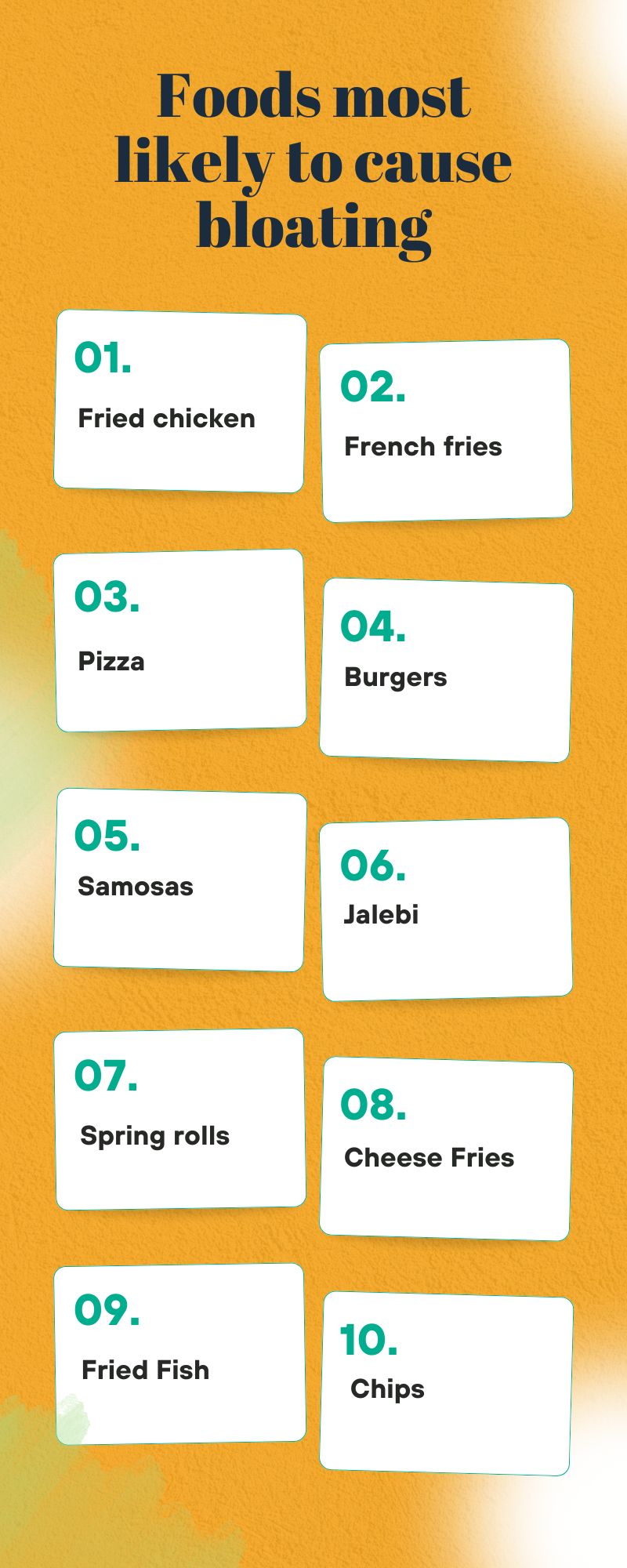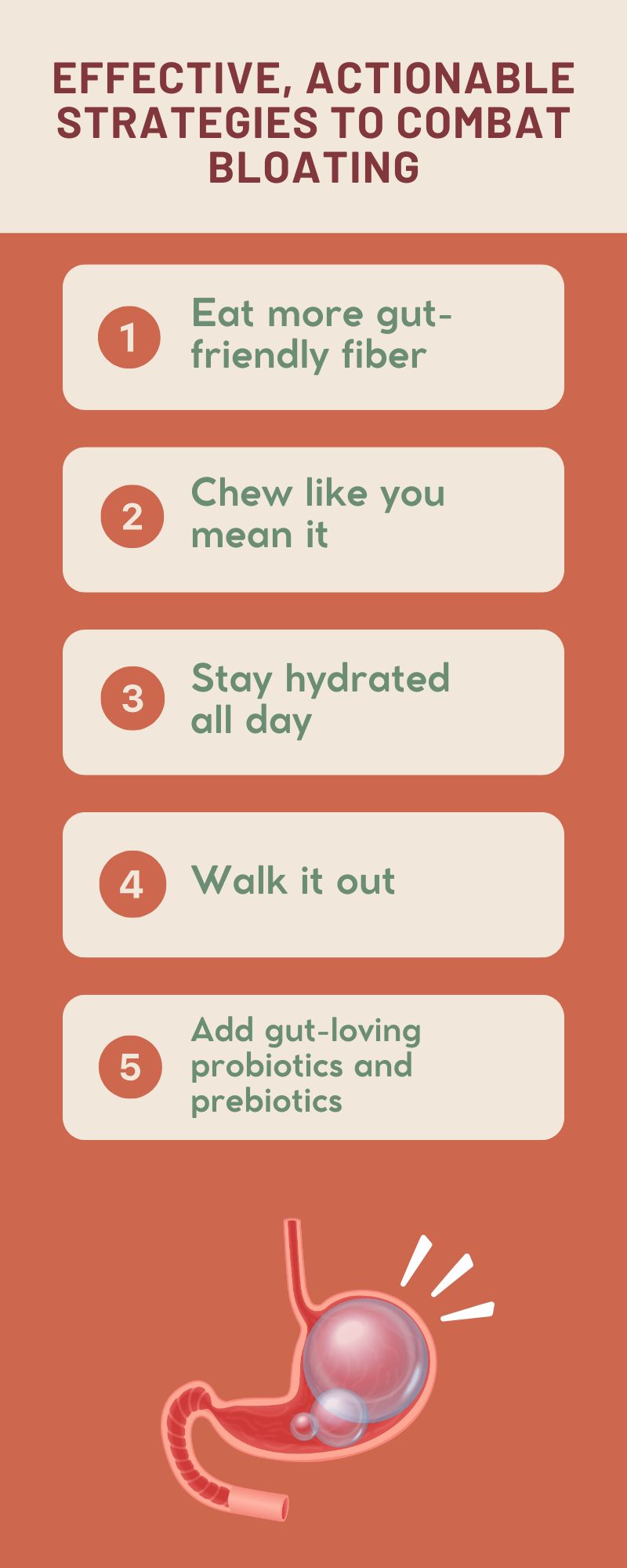We all have those days. You dig into a cheesy pizza, maybe a few samosas or fries on the side, and within an hour, bam, your stomach feels like it’s doubled in size.
Bloating after eating greasy or fatty foods isn’t just uncomfortable. It can feel frustrating, especially when your body seems to be working against you. But here’s the good news: once you understand what’s happening inside your gut, you can make pain-free, bloat-free choices without giving up the joy of eating.
Key takeaways
-
Greasy, fatty foods slow down digestion and often lead to bloating, gas, and a feeling of heaviness.
-
Fatty meals are more difficult to break down and can disrupt your gut microbiome, exacerbating bloating.
-
Common bloating triggers include fried foods, fatty meats, processed snacks, and full-fat dairy.
-
Simple swaps, such as baking instead of frying, choosing lean proteins, and increasing fiber intake, can help alleviate discomfort.
-
Staying hydrated, eating slowly, and incorporating probiotics and prebiotics (such as The Good Bug’s products) can support smoother digestion and a healthier gut.
Let’s take a look at what happens when fatty foods hit your plate and how you can support your digestion, rather than sabotaging it.
What happens in your body when you eat greasy foods
Fatty foods are delicious, comforting, and surprisingly heavy on your gut.
Here’s why they can leave you feeling sluggish and bloated:
Fat takes its time
Fats are slow to digest. Unlike carbs or proteins, which your body breaks down relatively quickly, fats require more effort to break down. The digestive system kicks into gear, prompting the liver to produce a dose of bile to emulsify the fats. But when you consume a heavy meal loaded with greasy food, your body gets overwhelmed.
The process slows way down, and you’re left with food just sitting in your stomach, fermenting, producing gas, and stretching things out (literally).
It throws off your gut’s rhythm
Greasy foods can also disrupt your gut microbiome, a community of trillions of bacteria. When digestion slows, undigested food becomes a feast for certain gut bacteria that thrive on fermentation.
While they’re doing their job, they release gases like hydrogen and methane, which expand your abdomen, increase pressure, and give you that ballooning feeling.
Some foods make it worse
Full-fat dairy, fried meats, and processed foods don’t just burden your digestion. They relax the valves in your digestive tract (like your lower esophageal sphincter), increasing the likelihood of gas escaping upwards as burps, or getting trapped and making you feel uncomfortably full.
If you have sensitive digestion, IBS, or food intolerances, this effect gets magnified tenfold.
Looking for a way to support digestion and reduce bloating? Try The Good Bug's probiotics for a healthier gut.
The main culprits behind the bloat
Greasy meals don't just slow digestion, they disrupt key processes in your gut that trigger bloating, gas, and discomfort.
Slow digestion = More gas
The slower the food moves, the more time it has to interact with gas-producing bacteria. This leads to a traffic jam in your gut, think of it like rush hour, but inside your digestive system. You’ll feel it as bloating, heaviness, and sometimes cramps or discomfort when bending or moving.
Fat and your gut microbiome
Consuming too much fat too often can shift your gut bacteria toward an imbalance. When harmful microbes outnumber helpful ones, your digestion slows, inflammation increases, and suddenly, you're bloated even after small meals.
Underlying sensitivities you might overlook
Fatty foods can trigger stronger reactions in people with existing conditions, such as IBS, SIBO (Small Intestine Bacterial Overgrowth), or food intolerances. Dairy, for instance, contains lactose, a type of sugar that many people can’t fully digest.
When it reaches your colon undigested, bacteria go to work, creating gas and bloating as a byproduct. Similarly, some oils and additives in processed foods can be irritating to a sensitive gut.
Say goodbye to bloating with Bye Bye Bloat! Incorporate The Good Bug’s synbiotic powder for smoother digestion and a balanced gut.
Foods most likely to cause bloating (And what to eat instead)

Now that we’ve covered the why, let’s talk about the what.
Some foods are known bloating offenders, but that doesn’t mean you have to commit to boiled vegetables for every meal. Instead, swap wisely.
Here are ten common greasy foods that often lead to bloating, and lighter, gut-loving alternatives you can try instead:
1. Fried chicken
Greasy and hard to digest, fried chicken can leave fats lingering in your gut for hours.
Try this instead: Grilled or air-fried chicken breast with herbs.
2. French fries
Deep-fried in oil and high in salt, these are a known trigger for bloating.
Try this instead: Baked sweet potato fries with a drizzle of olive oil.
3. Pizza
The triple combo of cheese, oil, and fatty meats isn’t great for digestion.
Try this instead: A thin-crust veggie-loaded pizza with light cheese or plant-based options.
4. Burgers
Fatty beef patties and processed buns can slow digestion.
Try this instead: Lean turkey or veggie burgers on whole-grain buns with fresh greens.
5. Samosas
Fried outer layers plus rich filling = digestive chaos.
Try this instead: Baked vegetable samosas with whole-wheat wraps.
6. Jalebi
Deep-fried and sugary, jalebi can be hard on your gut.
Try this instead: Baked whole wheat coconut laddoos for a lighter, digestion-friendly treat.
7. Spring rolls
Fried versions are typically high in oil and can be difficult to digest.
Try this instead: Rice paper rolls loaded with lean protein and crunchy veggies.
8. Cheese Fries
Double trouble: fried and dairy-laden.
Try this instead: Roasted potato wedges topped with herbs and a sprinkle of cheese.
9. Fried Fish
Fish is nutritious, until it’s deep-fried.
Try this instead: Grilled or baked fish with lemon and roasted garlic.
10. Chips
Crispy, salty, oily chips hit all the bloating-trigger zones.
Try this instead: Homemade veggie chips baked in olive oil and sea salt.
Support your digestion with The Good Bug's Gut Cleanse Shots for a refreshed gut and improved overall wellness.Watch Tisca Chopra share her transformative Gut Cleanse journey with The Good Bug and discover how it improved her digestive health.
Practical, actionable tips to beat bloating

Simple lifestyle tweaks and mindful eating habits can make a significant difference in reducing bloating and maintaining a healthy digestive system.
1. Eat more gut-friendly fiber (but go slow)
Whole grains, fruits, and vegetables help keep food moving through the digestive system. Start gradually, and drink plenty of water to avoid gas buildup.
2. Chew like you mean it
Digestion begins in the mouth. Chewing thoroughly reduces the work your stomach has to do. It also lessens how much air you swallow, another bloating trigger.
3. Stay hydrated all day (not just at meals)
Water is crucial for digestion, but gulping it during meals can dilute stomach acids. Instead, spread your intake throughout the day to help your body break down food efficiently.
4. Walk it out
A short stroll after meals can stimulate digestion and reduce bloat. It doesn’t need to be intense, just consistent.
5. Add gut-loving probiotics and prebiotics
Think of it as feeding your gut garden. Probiotics (like yogurt, kefir, and fermented vegetables) introduce healthy bacteria. Prebiotics (such as garlic, onion, and banana) feed them. Together, they regulate digestion and reduce bloating.
Bloating doesn’t have to be your default after every indulgence. Your body isn’t broken, it’s just asking for support, clarity, and a little more consistency.
Eating greasy food occasionally is part of life. But if post-meal bloating has become the norm, it may be time for a gentle gut reset. Choosing grilled over fried, eating mindfully, and adding supportive supplements can create a noticeable shift, not overnight, but definitely over time.
You deserve to feel good after a meal, not weighed down by it.
Ready to say goodbye to bloating? Explore our range of gut-friendly products at The Good Bug and enjoy smoother digestion with every meal.
FAQ’s
Why do greasy foods make me feel so bloated?
Greasy foods take longer to digest, leading to gas buildup and fermentation by gut bacteria, which causes bloating.
Which foods are the worst offenders for post-meal bloating?
Fried chicken, French fries, pizza, burgers, samosas, doughnuts, and other deep-fried or high-fat foods are significant contributors.
Can dairy make bloating worse?
Yes, full-fat dairy can slow digestion, and for people who are lactose intolerant, it commonly triggers gas and bloating.
Are there healthier alternatives to greasy favorites?
Absolutely! Try grilling or baking instead of frying, choose lean proteins, and use fiber- and veggie-rich sides.
How can I prevent bloating after eating fatty foods?
Eat smaller, slower meals, chew well, stay hydrated, walk after eating, and include probiotic or prebiotic foods and supplements in your diet.
Can probiotics help with bloating?
Yes, quality probiotics like The Good Bug’s products help restore balance in your gut, supporting smoother digestion and less bloating.
Is it normal to bloat every time I eat greasy food?
Occasional bloating is common, but frequent discomfort may indicate underlying issues. Consider making gut-friendly swaps and consulting a nutritionist if the discomfort persists.
What daily habits support a healthy gut and prevent bloating?
Prioritize a balanced, fiber-rich diet, manage portion sizes, maintain hydration, and supplement with scientifically backed probiotics and prebiotics.



